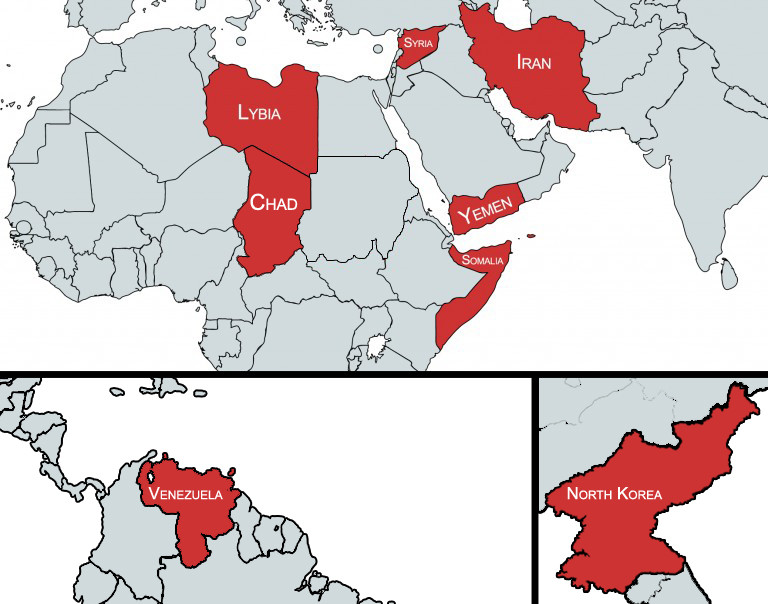In a February decision, a judge of the US District Court (Northern District of California) decided that a lawsuit filed on behalf of litigants challenging the “Travel Ban” could proceed over the government’s objection. The case, Emami v. Nielsen, is filed as a class action that could have far-ranging impacts.
The Travel Ban, first issued by Presidential Proclamation 9645 in September 2017 and modified thereafter, presently bars most entries to the United States by nationals of Iran, Libya, Somalia, Syria, and Yemen. The underlying rationale advanced by the government is that certain countries are deficient in their identity-management and information-sharing capabilities, and consequently, travel to the United States by nationals of those countries poses a serious risk to US national security and public safety. Amidst some public criticism that the Proclamation is a “Muslim Ban” for all intents and purposes, the US Supreme Court in Trump v. Hawaii upheld the constitutionality of a US president to issue executive orders barring entry of foreign nationals in order to protect national security.
The litigants in the district court case, Emami, complain that a key underpinning of the Hawaii decision by the US Supreme Court is the asserted existence of a meaningful waiver process. According to the Proclamation visa applicants may seek a waiver from the ban if (i) denial of entry would cause undue hardship, (ii) entry would not pose a national security or public safety threat, and (iii) entry would be in the national interest. Some of the waiver-eligible examples provided in the Proclamation are for close family relationships (such as spouse, child or parent of US citizens and permanent residents), and for significant business and professional obligations. The Emami litigants – consisting of a Family Class (close family members in the United States), and Applicant Class (visa applicants from the banned countries who were denied) — presented allegations that the waiver process effectively did not exist, even for applicants meeting the three factors identified in the Proclamation. (A different lawsuit, PARS v. Pompeo, advances similar arguments, and was recently transferred to the same district court judge.)
One of the Family Class litigants, an OBGYN doctor originally from Iran who is now a US citizen, complains that although the petition for her parents had been approved by USCIS, the parents’ immigrant visa applications were denied without any reasons provided. One of the Applicant Class litigants is an investor with an approved EB-5 immigrant investor petition, who was denied an immigrant visa without explanation. Both the Emami and PARS cases include many family members separated by the Travel Ban, including a teenager in war-torn Yemen, as well as a Somali refugee left to care for her four children, separated from her US resident husband. In support of the complaint filed, the litigants allege there’s no established process for reaching decisions on waiver applications; there’s no actual application form for
the waiver, as applicants are expected to put forth qualifying evidence during the interview process; many applicants are not permitted the opportunity to submit evidence that would support a waiver; US consular posts use form notices that do not appear to allow for approval of a waiver; and available statistics signal that less than 2% of the applicants who appear they might be eligible for a waiver are actually approved.
The government had sought to dismiss the Emami case, pointing to the US Supreme Court decision in Hawaii as having decided the legality of the Travel Ban. But the judge in Emami denied the government’s motion to dismiss, ruling that the plaintiffs allege a systemic failure of the relevant government agencies to provide a waiver application process in fact, and the mere “window dressing” of a waiver program (words of Justice Breyer in his Hawaii dissenting opinion) is being used to cover a de facto policy of blanket denials. The judge held that the complaint states a claim under the Administrative Procedure Act (APA) which provides jurisdiction and authority for setting aside any agency action that is arbitrary, capricious, an abuse of discretion, or otherwise in violation of law. The complaint states a claim under the APA, reasoned the judge, insofar as it alleges the government agencies are not following their own procedures and rules in administering the waiver program. Soon afterward, the Emami litigants filed a second amended complaint for purposes of clarifying their due process and equal protection theories. Once the parties are done skirmishing over the number of theories the court will allow the plaintiffs to pursue in the case, more than likely, the next round of this brawl would be over the scope of discovery the court will allow for the plaintiffs seeking more evidence of the government’s visa and waiver adjudication standards and practices.
Unrelated to the litigation, Congress has received more Department of State information about waivers. According to US Senator Van Hollen, the government statistics show that only 6% of applicants are granted waivers.
The Emami and PARS cases hold out some hope for the many families separated by the Travel Ban, and for the many intending immigrants placing their futures on hold. In the meantime there appears to be more talk than substance in the waiver program, and the nationals of the banned countries continue to wrestle with the very high risk of denial. Stay tuned.

